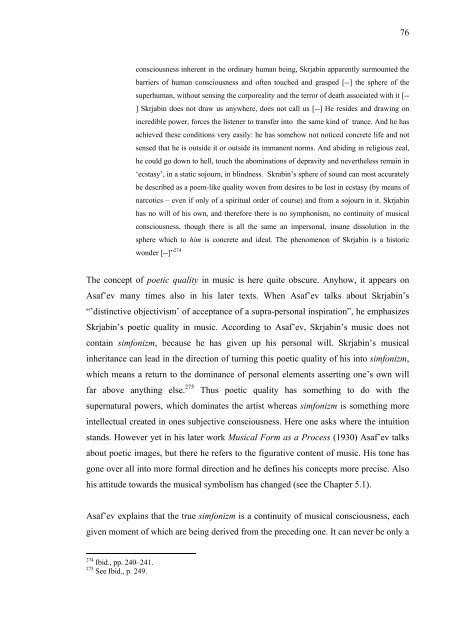Boris Asaf'ev and the Soviet Musicology - E-thesis
Boris Asaf'ev and the Soviet Musicology - E-thesis
Boris Asaf'ev and the Soviet Musicology - E-thesis
You also want an ePaper? Increase the reach of your titles
YUMPU automatically turns print PDFs into web optimized ePapers that Google loves.
consciousness inherent in <strong>the</strong> ordinary human being, Skrjabin apparently surmounted <strong>the</strong><br />
barriers of human consciousness <strong>and</strong> often touched <strong>and</strong> grasped [--] <strong>the</strong> sphere of <strong>the</strong><br />
superhuman, without sensing <strong>the</strong> corporeality <strong>and</strong> <strong>the</strong> terror of death associated with it [--<br />
] Skrjabin does not draw us anywhere, does not call us [--] He resides <strong>and</strong> drawing on<br />
incredible power, forces <strong>the</strong> listener to transfer into <strong>the</strong> same kind of trance. And he has<br />
achieved <strong>the</strong>se conditions very easily: he has somehow not noticed concrete life <strong>and</strong> not<br />
sensed that he is outside it or outside its immanent norms. And abiding in religious zeal,<br />
he could go down to hell, touch <strong>the</strong> abominations of depravity <strong>and</strong> never<strong>the</strong>less remain in<br />
‘ecstasy’, in a static sojourn, in blindness. Skrabin’s sphere of sound can most accurately<br />
be described as a poem-like quality woven from desires to be lost in ecstasy (by means of<br />
narcotics – even if only of a spiritual order of course) <strong>and</strong> from a sojourn in it. Skrjabin<br />
has no will of his own, <strong>and</strong> <strong>the</strong>refore <strong>the</strong>re is no symphonism, no continuity of musical<br />
consciousness, though <strong>the</strong>re is all <strong>the</strong> same an impersonal, insane dissolution in <strong>the</strong><br />
sphere which to him is concrete <strong>and</strong> ideal. The phenomenon of Skrjabin is a historic<br />
wonder [--]” 274<br />
The concept of poetic quality in music is here quite obscure. Anyhow, it appears on<br />
Asaf’ev many times also in his later texts. When Asaf’ev talks about Skrjabin’s<br />
“’distinctive objectivism’ of acceptance of a supra-personal inspiration”, he emphasizes<br />
Skrjabin’s poetic quality in music. According to Asaf’ev, Skrjabin’s music does not<br />
contain simfonizm, because he has given up his personal will. Skrjabin’s musical<br />
inheritance can lead in <strong>the</strong> direction of turning this poetic quality of his into simfonizm,<br />
which means a return to <strong>the</strong> dominance of personal elements asserting one’s own will<br />
far above anything else. 275 Thus poetic quality has something to do with <strong>the</strong><br />
supernatural powers, which dominates <strong>the</strong> artist whereas simfonizm is something more<br />
intellectual created in ones subjective consciousness. Here one asks where <strong>the</strong> intuition<br />
st<strong>and</strong>s. However yet in his later work Musical Form as a Process (1930) Asaf’ev talks<br />
about poetic images, but <strong>the</strong>re he refers to <strong>the</strong> figurative content of music. His tone has<br />
gone over all into more formal direction <strong>and</strong> he defines his concepts more precise. Also<br />
his attitude towards <strong>the</strong> musical symbolism has changed (see <strong>the</strong> Chapter 5.1).<br />
Asaf’ev explains that <strong>the</strong> true simfonizm is a continuity of musical consciousness, each<br />
given moment of which are being derived from <strong>the</strong> preceding one. It can never be only a<br />
274 Ibid., pp. 240–241.<br />
275 See Ibid., p. 249.<br />
76

















